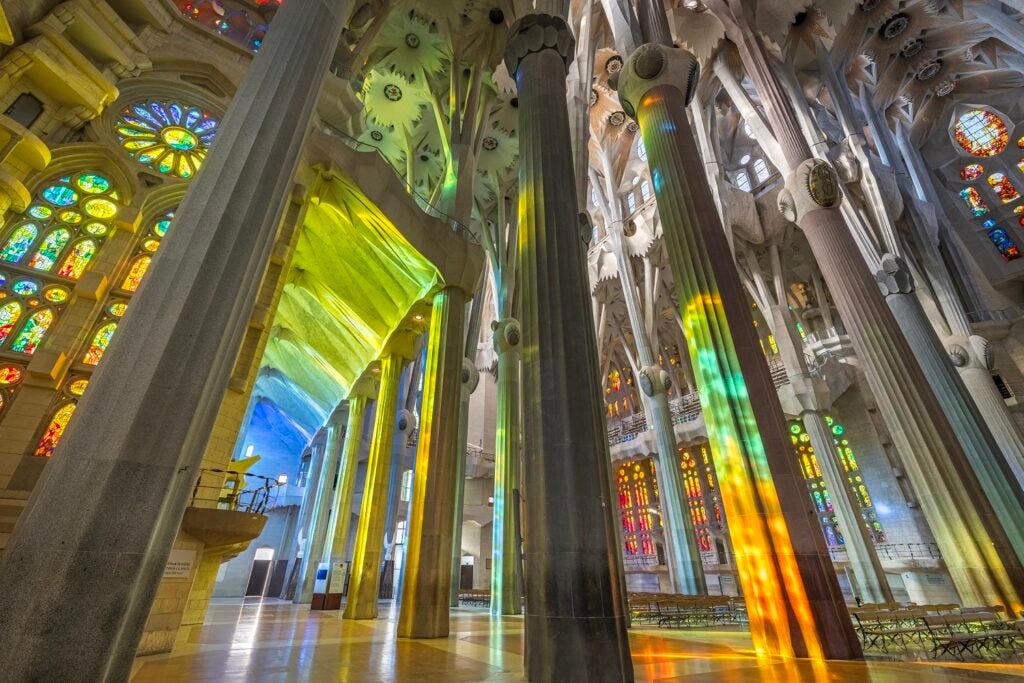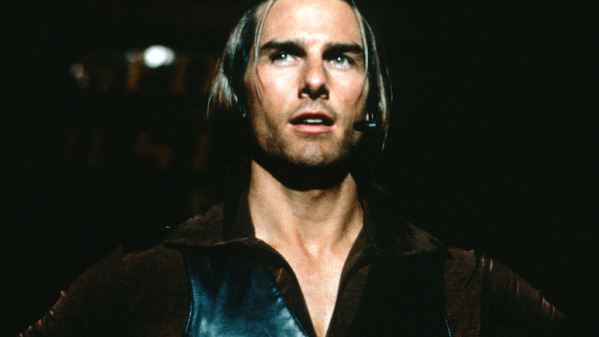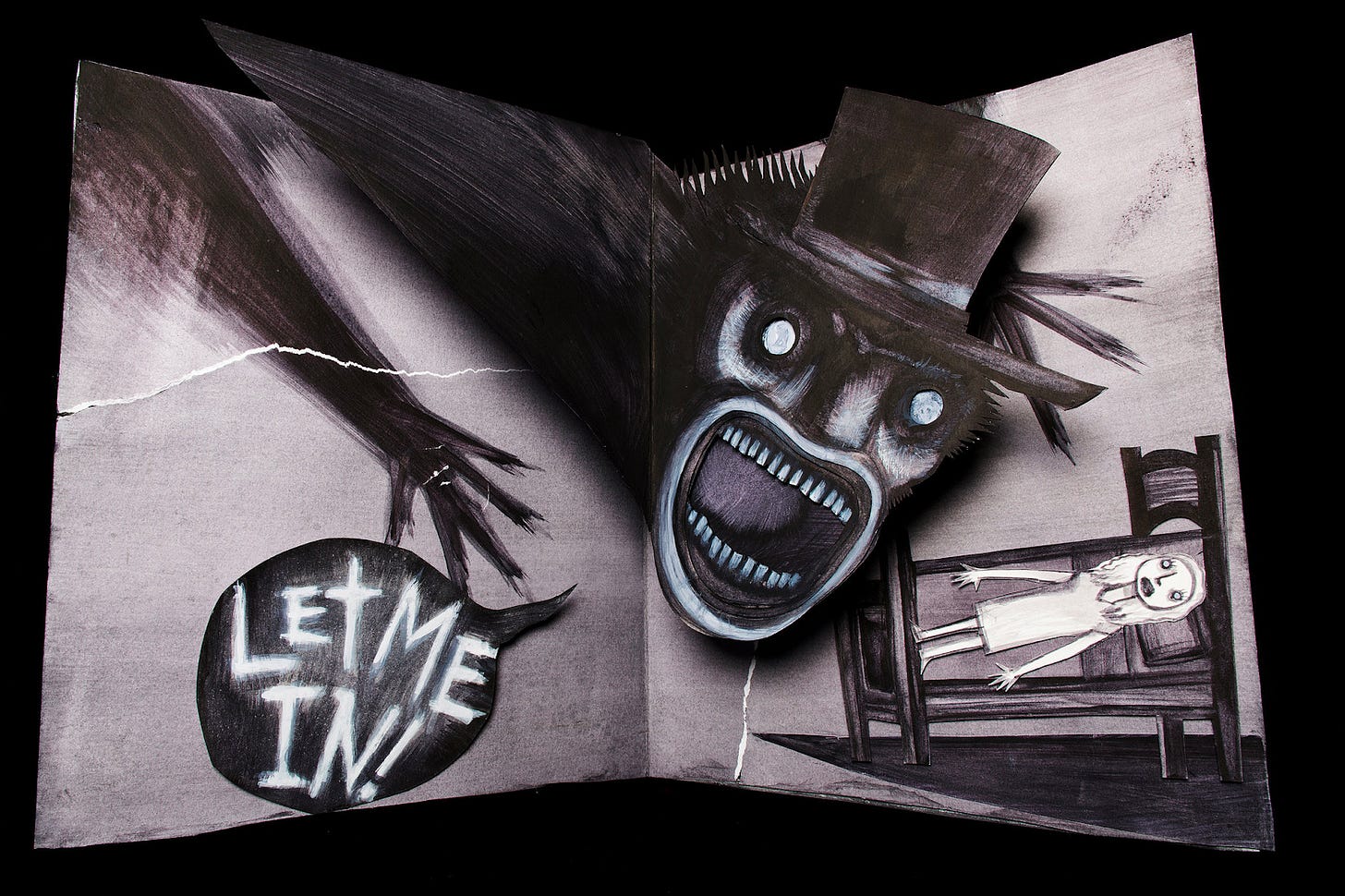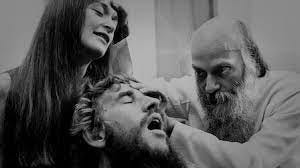The Spiritual-But-Not-Religious Horsemen of the Apocalypse
Spiritual self-help is a parasite adapted to our religious instincts.
I spent thousands to go to a Joe Dispenza meditation retreat.
Part of me thought of it as a fun experiment – a lark. But I also probably believed (hoped) there was a chance that I could unlock something… more.
Out of the thousands attending, I was randomly chosen to have my brain scanned while meditating.
I was sitting in a small office room the day before the event, getting a baseline brainwave measure. "They called me 'big head' when I was a kid," I explained as the neuroscientist tried to jam the too-small cap over my skull.
"I can see why," she said. “Must be a big brain in there.”
“Mostly hot air,” I said. She laughed. Her kindness put me at ease.
Then she pulled out a giant, dull syringe and used it to squirt gel to stick the two dozen metal nodes to my head, soaking through my hair. The nodes need to make electrical contact with my skin to measure the brainwaves going on just behind my skull. The process took over half an hour. Like during a good haircut, I nodded off.
I was exhausted from driving from Los Angeles that day. This event was in Aurora, Colorado.
When she finished, she told me to put in headphones and listen to a 30-minute Joe Dispenza voice-guided recorded meditation. I fell into a deep sleep in about 10 seconds.
"You showed a lot of slow theta brainwave patterns," she told me afterward, impressed. That meant I was very relaxed.
“Nice!” I didn’t mention I was dead asleep.
The next morning, a thousand gathered in a huge ballroom to listen to Dispenza’s first lecture. Exciting stuff.
After he finished speaking, the massive lights dimmed, and we all did a guided meditation together, with Dispenza on the dark stage, speaking softly into the microphone. “Feeeeeeel….. the blackness….”
Since I was one of the thirty selected to be studied, I sat in the far back to have my brainwaves measured again. Here I am wearing my brain cap and, for some reason, looking like just I shit my pants and I’m trying to be cool about it:
I’ve been meditating for a few years and had a good experience (light visuals and a good mood), but nothing crazy happened.
Other people, however, had intense mystical experiences. They would spontaneously “pop,” as they called it. From where I was sitting, they screamed and writhed around on the carpet. I would probably think they’re faking it, but those hooked up to a brain scanner showed a massive spike in sustained gamma wave patterns. Can’t fake that, I don’t think.
Even weirder, normal-looking people stepped on the stage and shared surprisingly convincing stories of regrowing jaw bones and healing Parkinson’s and encountering strange, higher-dimensional “beings.”
I wanted to believe. And, I’ll admit, I was wrapped up in the intensity of the experience. But still, I’m a skeptical guy. And luckily, I had access to neuroscientists to share my doubts with.
My scientist friend had a few hypotheses. She gave me some hints about what they were. She and her colleagues hoped to publish papers on this data, so she couldn’t tell me what she really thought was going on. She was cool and observant, like a good scientist.
However, her measured and reasonable attitude was… different from some people attending.
One guy handed me a business card claiming he could do energy healing, shadow work, reiki, psychic predictions, and astrology. The back of the card identified him as an incarnation of both Aphrodite and Apollo. From what little I know about those two deities, I don’t think they could get along in this small man's body.
At the lunch table, one woman shared a disturbing video where she was "possessed" by spirits who were "healing" her by making her beat her injured leg with her fist. Her propped-up cell phone recording her suddenly fell at the end of the video. She looked at us, eyes wide with wonder, and said, "That was the spirit." She told us she sent the video to the Joe Dispenza team. They responded not to tell anyone but to "keep spreading the good news" about her healing.
I went into the experience knowing I was at the boundary of "reasonable." But moments like this made me wonder what the hell I was doing there.
At the time, my life was in transition. It was after a breakup. I was worried about my career. A lot of my life felt up in the air. Making all that worse, this was during COVID, and the lockdown had me completely isolated back in LA. So, I was more willing to rationalize this stuff.
My scientist friend and I chatted about how the scientific community tends to attribute miraculous outcomes (like spontaneous remissions) to "the placebo effect" without noticing that it is an absolutely baffling phenomenon. What the hell do you mean you can heal yourself if you believe?
She also thought the “beings” people encountered during deep meditations were Jungian archetypes. We had a great, long conversation down that rabbit hole.
But exactly how deep this stuff went seemed to be up for debate for her. It's not the case that we are biological machines that can only be repaired with scalpels and chemical pills. But it's also true that you can still die of cancer with the perfect meditation routine. And people do.
It happened at the event.
Toward the end, we gathered around a girl with stage 4 cancer. All her hair was gone from the chemo. I had my brain scanning cap on as we circled her to "heal" her by sending her "positive energy" (whatever the hell that is). Honestly, I don't know what to make of this. I felt weird about it. The girl screamed in the middle of our circle as bad "spirits" left her body. If you've ever seen the exorcist, you have roughly the right idea. This was a secular version of faith healing. Even for a skeptic like me, it was intensely emotional.
After it was all over, in my overwhelming desire to “believe” in whatever the hell was happening, I said something that I regret: As she hugged me, I said, "I'm glad you decided to stick around."
Oh boy. What can I say? I was caught up in the moment. But she smiled politely, thanked me, and we all moved on.
Everyone involved was added to a group text to keep up with her healing. We all got updates over the next few weeks. People sent plenty of “positive vibes.”
One morning, we got a text that she had passed away. It was a gut punch.
Nobody had the spiritual tools to deal with it (you can’t meditate death away, after all). Everyone in the group responded with sympathy, of course. But, after a week or so, communication fell off. People left the group.
How do you handle tragedy if your central philosophy is to “meditate your way to health and happiness?”
To be very clear, I don’t think Joe Dispenza is a bad guy. I think he’s trying to help as many people as possible (and it seems to be working). This is not meant to be negative toward him and what he’s doing. However, I’m using what felt like a semi-religious experience to shed light on our culture's noticeable lack of good containers for this sort of thing. And, as a result, our insane hunger for them.
Traditional spiritual communities (religions) weren’t just about revelations and miracles; they were part of people’s daily, mundane lives (and death): prayer, community gatherings, and rituals. The life-affirming myths were not just in your mind but also in your blood and bones. And in the stones of the beautiful buildings, for that matter.
The community would not just lift you up, but also catch you when you fell. Sure, you could pray about cancer and maybe even “heal” it in some cases (spontaneous remissions are real). But, when that didn’t work, at least you had people around who loved you. Self-help’s “positive thinking” trains us to abandon those lost to the darkness.
Despite all our modern reasonableness, we still need spiritual communities.
People watch Star Wars (or, at least, they used to) with religious devotion. But singing hymns about Luke Skywalker on Sunday morning would feel silly. There’s a gap between our feelings and embodied action. People don’t think the stories (which they care more about than their own family in some cases) are “real.” Not really.
So, searching for answers to the deepest questions, we turn to more “real” non-fiction content. I get it. I’m a highly verbal modern person who doesn’t believe (not really) that reality comes to me through myth. Mostly, I want to listen to podcasts and read non-fiction. I want my narrative filtered through these materialistic, predictable mediums so I feel like I have control — so the strangeness of myth doesn’t overwhelm me.
But this devotion to dry headiness left us vulnerable to pseudo-religions. Self-help gurus often use this dry “scientific” language to sell us on their semi-religion.
“Science is the contemporary language of mysticism.” – Joe Dispenza
But, we aren’t interested in self-help gurus because of their scientific “information.” Clearly. They say obvious things like “believe in yourself.” What we find satisfying are the stories of transformative experiences — the resurrection. The myth. We’re trying to absorb the transformative myth sideways, so we don’t even realize we did it.
We go to his seminars, read his books, and even learn about the details of his personal life. Why? We are trying to imbue ourselves with his holistic transformation. To do that, we need a jumping-off point. Or, rather, a jumping-in point.
But, because we have such an allergy to religious myths, we must mix the medicine we need into the peanut butter of “science” so we can stomach it. The result is anemic half-myths as ugly as the modern venues in which they are held.
We settle for a mild poison because we won’t allow ourselves the true medicine, which would more likely need to be contained not in sterile modern science but in unreasonable mythic beauty:
In the movie “Up in the Air.” George Clooney gives self-help seminars around his horrific self-centered lifestyle. He preaches that the people you love are nothing but dead weight in your backpack. All to justify his fear of intimacy.
“Magnolia” is another great example (Cruise’s performance is excellent) of religious devotion used to compensate for a deeper underlying insecurity. He offers lost men (even more relevant today) the religious enthusiasm missing in modern life – but since he is devoted to sexual dominance and a secret fear of women, it is a self-defeating myth.
We go to ugly places and listen to obvious cliches because we won’t fully accept we need religious experiences to change our lives. We are vulnerable to salesmen leveraging our religious instinct as a patchwork solution for our emotional wounds. They smartly shroud their myth-making in science-y talk, so you don’t notice it’s a religious experience until you’re having it. And, for them, it’s payday.
They know you can’t transform a human soul with “Atomic Habits.” That’s just moving the deckchairs around on the Titanic. The only way to transform a self-referential system is to go into the depths of these incomprehensible and non-left-brain stories and allow them to take us over in a way that we cannot comprehend so that we can be fully reborn.
In other words, you need a paradigm shift, which is religious/spiritual by definition.
We crave these religious transformations. But many of us don’t believe they’re “reasonable,” so we lock them in the basement like the Babadook. There, they become monstrous.
The “Babadook” also represents the hells, devils, and demons of religion — the parts of our experience we don’t like (like the girl dying of cancer). You need a mythical representation of demons because…. well, they’re real. Mostly, self-help gurus have no incentive to remind you of these shadows. But you need to know, so I’ll remind you. You’re going to die. And you’re probably going to suffer before you do. You’re going to lose friends. You likely haven’t had the worst day of your life yet. Here’s the religious question: What kind of person do you want to be when those days come? The guru won’t care – because they’ll already have your money, and you’ll be too “negative” to be around by then. Despite what spiritual self-help says, not everyone who succumbs to decay is “toxic” or “negative.” We all succumb to decay eventually.
We need a myth that has an answer for that. I understand that’s difficult, and I don’t necessarily blame self-help gurus for being unable to offer it.
Watch as this man, embittered by how self-help has failed him, lashes out at Esther Hicks about the existence of evil. Self-helper Esther Hicks (or “Abraham Hicks,” the multiple-spirit being who possesses her) has no satisfying answer for him. More “positive thinking” is her only antidote to war, disease, and betrayal.
It’s by far her most popular video. Obviously, she doesn’t seem to think it’s as damning to her entire philosophy as I do.
Interestingly, Hicks refers to herself as “we” when possessed by the spirit of “Abraham.” “We” is multiplicity, and multiplicity of aims means you are confused. I mean, she can worship whatever she (they?) wants (and everyone worships something). But, if you plug 40 destinations into your GPS, you’re not heading to 40 locations — you’re going nowhere.
These pseudo-religious leaders use mystical experiences, spirit channeling, and even psychedelics to show there is more to life than it seems. They’re right about that. But they fail to show you which of those higher “beings” is worth your attention (and therefore devotion). They open floodgates without digging channels.
What’s worse, without a singular higher aim, leaders will likely confuse themselves with God, and followers will likely agree.
Fully realized, spiritual self-help is a vampiric religion that teaches us magic tricks and gives us unnaturally long life (like a vampire, see?). But it can’t help you deal with life's inevitable suffering and death. Still, we scuttle to these hotel ballrooms, devoid of beauty, and listen to these seminars narcissistically promising us more money, bigger houses, and cars that protect us from the slime of others. We believe they can become miniature gods—multi-level marketing titans.
All you have to do is sign up a few other gods in this pyramidal structure, and you’ll make a fortune! (It’s an upside-down funnel, Jim).
A mentor of mine told me he’s known people who have taken psychedelics and/or gotten into mediation and become “happy” but at the price of abandoning the needs of their kids and spouses. Sure, they are on their little “Live, Laugh, Love” journey – but it’s not integrated. It’s more like a never-ending manic episode.
He’s an article written by a guy in medical school who tried psychedelics and flew into a manic episode in which he refused to hear any “negative” information. It nearly ruined his life.
When we spiritually “pop” out of the context of our life (the same phenomenon of “popping” at the event), it allows us to feel a very real spiritual truth: base reality is “loving-kindness.” We can see it clearly without the burden of our life’s tangled story. But if we can’t lift the burden of life with that good news (for ourselves and others), then it’s just mania. We need “loving-kindness” marbled into the tiny cracks of our actual lives (being patient with our kids and not drinking ourselves to death), or we risk burning all our bridges for good.
Maybe if you do the slow work of untangling the knots of your life’s story, you will feel a sense of loving awareness, have a good life, and know that you earned it. Imagine that.
“Beware of wisdom that is not earned.” — Carl Jung
It’s not just the self-help industry that gets this wrong. This disconnect is deep in the fabric of our culture. In the daytime, we believe in this materialist nihilistic view where the only real things are concrete and glass. Then, at night, we float to a magical fairy dust land, where we can meditate to Nirvana and talk to DMT alien entities. Which way, modern man?
Our more “scientific” spiritual leaders don’t seem to be able to ground their mystical experiences (which they regard as very important) with their highly rational outlook — leaving them dry and sterile. Just listen to the dull, uninspired way Sam Harris talks (sorry, Sam) about staying in the “present moment.” It’s so boring I want to cry. It has no punch (myth).
I’m so damn tired of hearing about “The Power of Now” from all these spaced-out monotone-voiced spiritual gurus. Oh, everything except the present moment is an illusion? I guess all the awful things I’ve done in the past don’t matter. That’s convenient, thanks.
Except, if you don’t face the mistakes of the past, you are going to repeat them. So, really, they’re not an illusion. They’re real. That’s what your existential dread tries to tell you at 3 a.m. And, if you chronically ignore it by getting better and better at being “in the moment,” you will never learn a single lesson, and your life will be a very “real” disaster.
No amount of “realizing” that it’s all just a story will change that. You need to fix it.
It’s weird that we have to say this because humans have known it since the beginning of time: regularly visit the mythical in the form of ritual, community, and prayer and then weave that inspiration into the fabric of your life by being better to family and friends, spouses, and community. It’s so obvious that it hurts — but it needs to be said.
A dry meditation practice to make us more productive or “happy” doesn't capture the mythical/religious impulse at all. That impulse isn’t “old wiring” to “deal with.” It’s more real than the lamp at your bedside. It’s the oldest thing around. It’s older than your goddamn eyeballs. This stuff is built into our DNA and is fundamentally how we confront primordial chaos. The reason myths rhyme all around the world is because they are born of a singular, phenomenal reality.
Reality is narrative. That doesn’t mean it’s not real.
When you hear beautiful music or see a profound movie and your skin crawls, your hair stands on end, and tears fill your eyes, believe it. It’s the most true thing that you’ll ever know.
I’m not saying cynicism doesn’t win in little skirmishes here and there. But if doubt had one in the long run, your functioning body would not be here today, taking in calories and excreting a pantheon of gods.
But, be careful which of those gods you worship above all (and, again, we all worship something). We know by now that wealth, health, money, or fame are not the winning gods. Those will fail you the minute tragedy strikes.
My life never improved when I said positive affirmations (lies) in the mirror. Not on the whole, anyway.
My life improved when I dared to look at (write down) my mistakes and own up to them. I didn’t just need to “pop” off and live blissfully. I needed to fix my screwed-up story. That meant making apologies. Changing behavior. Writing down my fears. Telling people the truth when it would’ve been easier to stay “positive.”
“Follow your bliss blisters.” — Joseph Campbell
In other words, it is a voluntary confrontation of the suffering of life in the name of love. Every wisdom tradition has figured this out. It’s not a secret.
Without this, we languish in mediocrity and false control, worshiping golden calves. These idols may bring us wealth, health, and fame, but there is always a cost. And it is always too high.
What does that cost look like, you might ask? Say you really commit to your spiritual self-help routine 100%. As a result, you make a bunch of money and gather a huge following. But, in the end, you end up a lifeless “spiritual” spaced-out weirdo not living a real, embodied myth. I don’t know about you, but that’s not what I want.
That’s not to say that you can’t channel immense power in your life. But, to pull that off, you have to pay the full price upfront, sight unseen, with no idea what it will look like. That’s a leap of faith in the style of Kierkegaard.
If we could each truly face our deepest fears without knowing if it will all “work out,” we could transform the world. Maybe the government would be so terrified by us that we would be crucified. But the world would transform. And we would have an exciting adventure along the way.
Alexander Solzhenitsyn, Socrates, MLK, Mahatma Gandhi, and Nelson Mandela (to name an obvious few) all knew, on some level, that if you willingly took on the burden of suffering and death, despite not deserving it, you could transform the world. And they did.
Jesus, what else can we say? We probably won’t do it. But we could.
Thanks for reading,
Taylor













Thanks for the thoughtful dissection of spiritual and mystical practices and experiences. As you indicated explicitly (dissolution of the post-Dispenza retreat group) and implicitly (referencing Gandhi, MLK and Mandela), transformative spiritual experiences should result in and be aimed at increased, sustained, holistic, life-affirming, and self-sacrificial involvement in a community of others who find themselves somewhere along the same path. "Evil" can be easily sniffed out in the fruits of incomplete, misguided or deceptive spiritual teachings which fail to produce or even inhibit people from finding a community marked by mutual support, acceptance of differences, joyful inward AND outward service, and some form of fumbling toward unconditional love.
“Beware of wisdom that is not earned.” --- Happily concur with some of the other comments, this piece is really really wonderful. Honest, poignant, interesting and touching on something real; and since your wisdom here feels earned it rings all the more true. Thx Taylor.